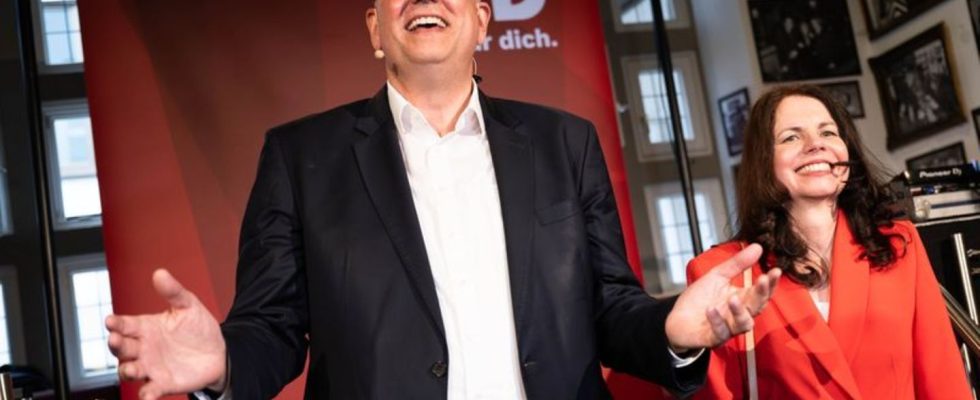For the Greens, the Bremen election was a severe defeat – things didn’t go well for the FDP either. In the federal government, both have now decided to show a clearer edge.
After their worst election result in the state of Bremen for more than 20 years, the Greens want to continue to campaign for their sometimes controversial climate protection policy in the federal government.
“You have to be aware that the Chancellery doesn’t like to grant the Greens any success, and that’s why an even clearer and tougher negotiating strategy is needed,” said Green politician Anton Hofreiter of the German Press Agency in Berlin. “We have to make sure that the compromises we find are accepted by all sides.” He told the “Handelsblatt” that his party must succeed in explaining better on the subject of climate protection.
The FDP, which only narrowly made it into the Bremen parliament, also wants to strengthen its profile. FDP federal deputy Wolfgang Kubicki told the dpa that his party must continue on its course and become “much more noticeable” in the Berlin traffic light coalition. With a view to the demands of the Greens for more climate protection in road traffic and heating, he said: “People can rely on us that nonsensical proposals with the Free Democrats will not find a majority in the German Bundestag.”
SPD won by a wide margin
The SPD won the Bremen elections by a wide margin ahead of the CDU. According to the official extrapolation of the state election authority as of 12.30 a.m., the Social Democrats of Mayor Andreas Bovenschulte came to 29.9 percent. They were thus able to improve their historically poor result from 2019 (24.9 percent). A continuation of the previous red-green-red coalition would be easily possible – but Bovenschulte announced that he would not only talk about an alliance with the Greens and the Left, but also with the CDU. The election winner spoke of a “terrific result” for his SPD, which has been the mayor for almost 80 years. SPD federal leader Lars Klingbeil saw “tailwind also for us here in Berlin”.
The Christian Democrats slipped slightly to 25.7 percent (2019: 26.7 percent). Lead candidate Frank Imhoff said his party was ready for exploratory talks with the SPD. “Of course we want to be involved.” CDU Vice Carsten Linnemann supports this and said that “a restart for Bremen” is needed.
The extrapolation based on the votes counted up to 12:30 a.m. is representative and the last one published on Monday night said a spokeswoman for the state election authority. The extrapolations should continue on Monday morning from 10.30 a.m. The provisional official final result should be available after the count on Wednesday (May 17th). The count is lengthy because of the complicated Bremen electoral system. When voting, voters could tick up to five boxes.
Significant losses for the Greens
According to the figures, the Greens came third with 11.7 percent, but with significant losses (2019: 17.4). Lead candidate Maike Schaefer spoke of a bitter result and said she was not afraid to take responsibility herself. However, the government coalition wants to continue.
Greens leader Omid Nouripour admitted that there was “certainly no tailwind” from the Greens in the federal government. Quarrels about personnel policy and the controversial heating law of Federal Minister of Economics Robert Habeck had recently added to the party. However, Nouripour emphasized that his party should “not hit the bushes” now.
Behind the Greens, the third coalition partner, the left, was able to stabilize with 11.2 percent (2019: 11.3). Dietmar Bartsch, the head of the Left parliamentary group in the Bundestag, said it was now important to use this momentum for the entire party. “A reinvigorated left is needed in Germany.” The top candidate and Bremen’s Senator for Economic Affairs, Kristina Vogt, was hoping for quick exploratory talks.
The right-wing populist voter association Bürger in Wut (BiW), which won 9.6 percent of the votes (2019: 2.4), made strong gains. The right-wing populist BiW benefited from the fact that the AfD was not allowed because it had submitted two competing electoral lists. In 2019 she got 6.1 percent. The BiW locate themselves between the CDU and AfD. Top candidate Piet Leidreiter said that BiW had always done good Realpolitik and had its own conservative offer.
The FDP just made it into the citizenship with 5.2 percent (2019: 5.9). Secretary-General Bijan Djir-Sarai said that was the main goal.
463,000 people called to vote
According to projections by ARD and ZDF, the SPD will receive 28 seats in the parliament. The CDU therefore has 24 to 25 seats, the Greens 10 to 11. The Left Party gets 10 mandates and the FDP 5. For the first time in parliamentary group strength, the BiW moves into the parliament with 9 seats.
In the smallest German federal state, the two-city state of Bremen and the smaller Bremerhaven, around 463,000 people were called to vote. The once rich Hanseatic city of Bremen, with its tradition of seafarers and merchants, has endured severe structural change and is now heavily indebted. According to the Federal Statistical Office, the proportion of recipients of citizen income, formerly known as Hartz IV, is the highest in a comparison of the federal states at 17.1 percent, and Bremen is also in last place in the ranking of the best education systems according to the INSM Education Monitor 2022.
According to the Bremen social department, the state has the highest proportion of people with a migration background among those eligible to vote at 17.8 percent – the national average is 11.5 percent. But the country is also a strong business location – with its ports, the world’s second largest Mercedes plant and aerospace companies.

